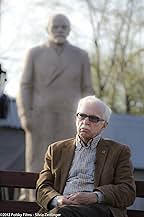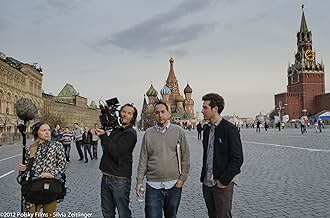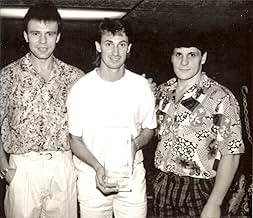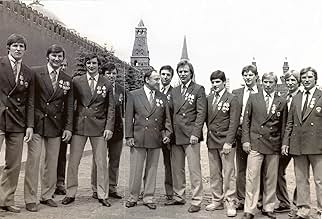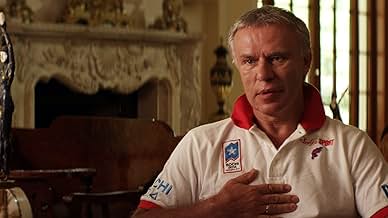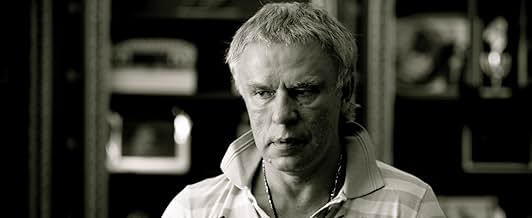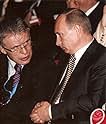IMDb RATING
7.6/10
7.4K
YOUR RATING
The story of the Soviet Union's famed Red Army hockey team through the eyes of its players.The story of the Soviet Union's famed Red Army hockey team through the eyes of its players.The story of the Soviet Union's famed Red Army hockey team through the eyes of its players.
- Awards
- 5 wins & 11 nominations total
Viacheslav Fetisov
- Self
- (as Slava Fetisov)
Herb Brooks
- Self - US Olympic Coach
- (archive footage)
- (voice)
Don Cherry
- Self - Hockey Commentator
- (archive footage)
- (voice)
Mark Deakins
- Self
- (voice)
- Director
- Writer
- All cast & crew
- Production, box office & more at IMDbPro
7.67.4K
1
2
3
4
5
6
7
8
9
10
Featured reviews
Among the greatest sports dynasties ever
Red Army (2014) documentary, directed by Gabriel Polsky, retells the story of probably the greatest dynasty in the history of sports, the Soviet Union national ice hockey team of the 1980's, and its best five-man unit featuring Viacheslav Fetisov and Alexei Kasatonov on defense, Vladimir Krutov, Igor Larionov, and Sergei Makarov (aka the KLM Line) at forwards, all in their 20s, aided by the legendary goalie, Vladislav Tretiak, in his 30s. The five dominated national and international hockey for nearly a decade.
Anatoli Tarasov, Russian hockey coaching pioneer, laid the foundation of their game and it was based on organized team movements and creativity to win the space, as well as individual puck control and its timely transfer into an empty space in the next zone of the rink, ultimately passing it over to a player in prosperous scoring position.
Soviet players, additionally subjected to military discipline included by Tarasov's successor, head coach Vladimir Tikhonov, who took over the Soviet national team in 1977, skated three times a day, eleven months of the year, "perfecting both, their individual skills and their teamwork." Knowing that "copy is never as good as the original", creative "father of Russian hockey", Tarasov, sought inspiration from other team sports, even from theatrical arts, primarily ballet, to create a unique style, "a completely new way of playing hockey, which changed the sport".
I was lucky to attend two matches of this incredible hockey team in the 1984 Winter Olympics in Sarajevo, the first one early in the competition and the second one in the finals. In the opening round, against Cuba, USSR had an easy task to win, and in addition to watching the great team performance I was enjoying individual virtuosity of USSR players, who managed to combine two seemingly incompatible traits, improvisation with harmonious and fluent team play, comparable maybe only to similar traits of the best jazz orchestras.
As I have been coincidentally seated right in front of him, I was also listening to the professional comments of Ivica Osim, one of the greatest footballers to grace the soccer fields of Sarajevo, who has had that far spent most of his active career whether playing for or coaching my favourite local team "Zeljeznicar", and was on his way to coach the national team of Yugoslavia soon. It was pure delight to listen to professional comments this great football enthusiast and expert had about the style and strategy of the Soviet national hockey team, and about the skills of its players, as well as comparison between the two sports, level of individual skills and tactics applicable in both. I can clearly remember Osim's comments and his longing for soccer outfield players of comparable individual skills, applicable in so called total football, based extensively on players' capability to cover not only for their nominal positions in the field, but rather, should it become required, to take over the role of any other player in the team.
Strength of this team, composed of players with incomparable skills was shown in the final game. Although the end result was not impressive, 2:0, nearly routine execution left no doubt who's dominant, and another participant, Czechoslovakia, practically had never had a chance to win.
Documentary, cleverly composed from interviews with three players of thus far surely the best five skater hockey unit ever to hit the ice, and from mixture of archive footage from their games, trainings and other life events, by showing how great and undefeatable they have been, really does them a great justice. Therefore, in the rest of this review I'll rather just add the words of the "Red Army" director, copied from a featurette "Gabe Polsky Hockey Commentary" found on a DVD:
(Red Army-Director Gabe Polsky discusses the essence of Soviet hockey-2014)
"I'm Gabe Polsky and I directed the movie Red Army. The Film is about the Soviet Union and the greatest sports dynasty in history. The Soviet Union national hockey team revolutionized sport, they took hockey and sport to a whole new creative level. When I was a young kid and I watched for the first time (the) Soviet Union play in a 1987 Canada Cup VHS tape it was a religious experience, it was incredible what they did on the ice creatively. This was the best hockey ever played in history. In the series you saw the greatest players from the Soviet Union face off against the greatest Canadian players. (Starting Line-ups: USSR (Fetisov, Makarov, Larionov, Krutov, Kasatonov) vs Canada (Grossman, Gartner, Gretzky, Messier, Bourque).) The Soviet style play here is like a finely tuned symphony: the passing, weaving, improvisation. (Situation description) Krutov hits the puck out of the air to his team mate Makarov who has a breakaway: improvisation and awareness. (Situation description) Here we see how they knew each other so well they could almost play blindfolded together. The passing is like an artistic tapestry. They transitioned fast and confused defenders with their movement. (Situation description) Here we see incredible skill and creativity, and a sense of one another. This kind of hockey was incredibly fun to watch. (Situation description) Here we see how quickly they punish you for mistakes. (Situation description) This is one of my favourite players showing the skill level of the Soviet players... (Situation description) The Soviet game and style is all about puck possession and passing we see here. (Situation description) Here's Sergei Makarov, one of the greatest magicians in hockey history, passes to Krutov and then has an accurate shot. (Situation description) Here tremendous skill, being able to shoot from any position. (Situation description) And this here (Demiensky breakthrough and score), my friend, is pure art... the essence of hockey."
Learning the essence and enjoying the art of ice hockey, indeed, while delightfully watching masters of the ice rink in their stellar moments.
Anatoli Tarasov, Russian hockey coaching pioneer, laid the foundation of their game and it was based on organized team movements and creativity to win the space, as well as individual puck control and its timely transfer into an empty space in the next zone of the rink, ultimately passing it over to a player in prosperous scoring position.
Soviet players, additionally subjected to military discipline included by Tarasov's successor, head coach Vladimir Tikhonov, who took over the Soviet national team in 1977, skated three times a day, eleven months of the year, "perfecting both, their individual skills and their teamwork." Knowing that "copy is never as good as the original", creative "father of Russian hockey", Tarasov, sought inspiration from other team sports, even from theatrical arts, primarily ballet, to create a unique style, "a completely new way of playing hockey, which changed the sport".
I was lucky to attend two matches of this incredible hockey team in the 1984 Winter Olympics in Sarajevo, the first one early in the competition and the second one in the finals. In the opening round, against Cuba, USSR had an easy task to win, and in addition to watching the great team performance I was enjoying individual virtuosity of USSR players, who managed to combine two seemingly incompatible traits, improvisation with harmonious and fluent team play, comparable maybe only to similar traits of the best jazz orchestras.
As I have been coincidentally seated right in front of him, I was also listening to the professional comments of Ivica Osim, one of the greatest footballers to grace the soccer fields of Sarajevo, who has had that far spent most of his active career whether playing for or coaching my favourite local team "Zeljeznicar", and was on his way to coach the national team of Yugoslavia soon. It was pure delight to listen to professional comments this great football enthusiast and expert had about the style and strategy of the Soviet national hockey team, and about the skills of its players, as well as comparison between the two sports, level of individual skills and tactics applicable in both. I can clearly remember Osim's comments and his longing for soccer outfield players of comparable individual skills, applicable in so called total football, based extensively on players' capability to cover not only for their nominal positions in the field, but rather, should it become required, to take over the role of any other player in the team.
Strength of this team, composed of players with incomparable skills was shown in the final game. Although the end result was not impressive, 2:0, nearly routine execution left no doubt who's dominant, and another participant, Czechoslovakia, practically had never had a chance to win.
Documentary, cleverly composed from interviews with three players of thus far surely the best five skater hockey unit ever to hit the ice, and from mixture of archive footage from their games, trainings and other life events, by showing how great and undefeatable they have been, really does them a great justice. Therefore, in the rest of this review I'll rather just add the words of the "Red Army" director, copied from a featurette "Gabe Polsky Hockey Commentary" found on a DVD:
(Red Army-Director Gabe Polsky discusses the essence of Soviet hockey-2014)
"I'm Gabe Polsky and I directed the movie Red Army. The Film is about the Soviet Union and the greatest sports dynasty in history. The Soviet Union national hockey team revolutionized sport, they took hockey and sport to a whole new creative level. When I was a young kid and I watched for the first time (the) Soviet Union play in a 1987 Canada Cup VHS tape it was a religious experience, it was incredible what they did on the ice creatively. This was the best hockey ever played in history. In the series you saw the greatest players from the Soviet Union face off against the greatest Canadian players. (Starting Line-ups: USSR (Fetisov, Makarov, Larionov, Krutov, Kasatonov) vs Canada (Grossman, Gartner, Gretzky, Messier, Bourque).) The Soviet style play here is like a finely tuned symphony: the passing, weaving, improvisation. (Situation description) Krutov hits the puck out of the air to his team mate Makarov who has a breakaway: improvisation and awareness. (Situation description) Here we see how they knew each other so well they could almost play blindfolded together. The passing is like an artistic tapestry. They transitioned fast and confused defenders with their movement. (Situation description) Here we see incredible skill and creativity, and a sense of one another. This kind of hockey was incredibly fun to watch. (Situation description) Here we see how quickly they punish you for mistakes. (Situation description) This is one of my favourite players showing the skill level of the Soviet players... (Situation description) The Soviet game and style is all about puck possession and passing we see here. (Situation description) Here's Sergei Makarov, one of the greatest magicians in hockey history, passes to Krutov and then has an accurate shot. (Situation description) Here tremendous skill, being able to shoot from any position. (Situation description) And this here (Demiensky breakthrough and score), my friend, is pure art... the essence of hockey."
Learning the essence and enjoying the art of ice hockey, indeed, while delightfully watching masters of the ice rink in their stellar moments.
Bleeding Red
Greetings again from the darkness. You need not be a hockey fan to be familiar with the "Miracle on Ice" upset of the seasoned Russians by the upstart Americans at the 1980 Olympics in Lake Placid. Often referred to as a battle of cultures – "our way vs their way, capitalism vs communism" – most articles, TV shows, and movies have been presented from the American perspective. It's only now, in this informative and entertaining documentary from filmmaker Gabe Polsky, that we gain some insight into the Russian players and their way of life.
Mr. Polsky is the son of Russian immigrants, and grew up playing hockey in Chicago and later for Yale. His research into Russian hockey evolved into a documentary that blends sports, geopolitics, history, culture, and personal stories. He mixes in some fantastic archival film footage from the 1970's and 80's, but the heart of everything here flows from the interviews with Russian hockey legend Vyacheslav Fetisov, who is a vital and unique link to past and present.
Fetisov is sometimes playful and sometimes snide in his remarks, but he basically narrates the history of Russian hockey – starting with Stalin's founding of the organization, through the two key coaches: father figure Tarasov and the militant Tikhanov who followed. Stalin was convinced that Russian domination of global sports would clearly establish communism and the Russian culture as far superior to capitalism and the carefree ways of the west. This led to the Red Army hockey camps being run by the military. The players were isolated for eleven months each year, training and playing in a manner that generated ultimate teamwork, but also quite unhappy young men.
We see the influence of Russian chess (Karpov) and the Bolshoi ballet for training methods, and we also see the ever-present KGB ensuring no "escapes", or what we might know better as defections. We learn about the Russian Five (including Fetisov) who were so dominant that the team went two years without losing. Gold medals in Sarajevo (1984) and Calgary (1988) occurred just prior to the 1991 dissolution of the U.S.S.R. and the economic crisis of the region.
This is what opened the door for Russian hockey players to enter the NHL, though the transition was smoother for some than others. After a few years of adjusting, it was coach Scotty Bowman's 1997 Detroit Red Wings that won the Stanley Cup with a contingency of Russian players (including Fetisov) who were given free reign to play their own game while on the ice. Their movements and intricate teamwork clashed mightily with the individualistic style of westerners and that group of Russian players can be credited with helping the game to evolve to its current style.
Much of the insight comes from the faces of the men who are interviewed. Their stoicism and lack of emotion is a microcosm of the society in which they were raised. Their country was obliterated by war, and then led by a megalomaniac who wanted to rule the world. Human emotion and the rights of individuals mattered little, and we see that despite the years of hardship, these players remain (mostly) true and loyal to their country. This is a fascinating look at human nature and how the culture of one's youth can directly impact the beliefs as an adult, so many years later.
Mr. Polsky is the son of Russian immigrants, and grew up playing hockey in Chicago and later for Yale. His research into Russian hockey evolved into a documentary that blends sports, geopolitics, history, culture, and personal stories. He mixes in some fantastic archival film footage from the 1970's and 80's, but the heart of everything here flows from the interviews with Russian hockey legend Vyacheslav Fetisov, who is a vital and unique link to past and present.
Fetisov is sometimes playful and sometimes snide in his remarks, but he basically narrates the history of Russian hockey – starting with Stalin's founding of the organization, through the two key coaches: father figure Tarasov and the militant Tikhanov who followed. Stalin was convinced that Russian domination of global sports would clearly establish communism and the Russian culture as far superior to capitalism and the carefree ways of the west. This led to the Red Army hockey camps being run by the military. The players were isolated for eleven months each year, training and playing in a manner that generated ultimate teamwork, but also quite unhappy young men.
We see the influence of Russian chess (Karpov) and the Bolshoi ballet for training methods, and we also see the ever-present KGB ensuring no "escapes", or what we might know better as defections. We learn about the Russian Five (including Fetisov) who were so dominant that the team went two years without losing. Gold medals in Sarajevo (1984) and Calgary (1988) occurred just prior to the 1991 dissolution of the U.S.S.R. and the economic crisis of the region.
This is what opened the door for Russian hockey players to enter the NHL, though the transition was smoother for some than others. After a few years of adjusting, it was coach Scotty Bowman's 1997 Detroit Red Wings that won the Stanley Cup with a contingency of Russian players (including Fetisov) who were given free reign to play their own game while on the ice. Their movements and intricate teamwork clashed mightily with the individualistic style of westerners and that group of Russian players can be credited with helping the game to evolve to its current style.
Much of the insight comes from the faces of the men who are interviewed. Their stoicism and lack of emotion is a microcosm of the society in which they were raised. Their country was obliterated by war, and then led by a megalomaniac who wanted to rule the world. Human emotion and the rights of individuals mattered little, and we see that despite the years of hardship, these players remain (mostly) true and loyal to their country. This is a fascinating look at human nature and how the culture of one's youth can directly impact the beliefs as an adult, so many years later.
Much more than just exciting hockey.
"Ninety percent of hockey is mental and the other half is physical." Wayne Gretsky
In Gabe Polosky's expert documentary, Red Army, the understanding of modern Russian hockey history filters through the influence of legendary coach Anatoly Tarasov. He taught young and old about how to play hockey like chess layered over with the best of communist collectivist philosophy—a blueprint for world-class teamwork dominance from 1954-91.
The star of this doc is Vyacheslav Fetisov ("Slava"), whose play, along with four other Russian teammates, dominated world hockey for years. His face full of character in middle age, his understanding of human nature, and his devotion to the best of what Russia could offer make for no-bathroom-break-allowed drama. His defection that results in losing his best friend, Kasatonov, is the stuff of real-life drama. Yes, there are arresting shots of hockey that seem more like perfect video games than the real-live action they are, but it's the humanity that make this film outstanding.
Slava is central-casting smart and handsome carrying an abiding love of the motherland conflicting with a heightened sense of things going wrong after the Cold-War halcyon days. To hear him extol the spirit of collective achievement is to put in relief our emphasis on individuality, for its strengths and weaknesses. Polosky does not belabor the good and bad of the competing systems but rather presents the victories and defeats as a matter of history and politics: "Draw your own conclusions," he might say.
That classic documentary "lack of bias" sometimes is frustrating. For instance, I would like to know how much of either ideology—American vs. Russian—plays in the "miracle" of the USA win at the 1980 Olympics in Lake Placid. Did the invulnerable Russian five suffer from their dislike of new coach Tikhonov's dictatorial ways (e.g., he wouldn't let a player leave to see his dying father!)? I need to go back, I guess, to another great doc, Miracle (2004), to see Kurt Russell play the legendary Herb Brooks and his victorious USA Olympic team. I suspect the reason for the Russian failure will be less apparent than the American victory.
I am nitpicking here because overall the film is exemplary historical reporting without forcing inferences about facile conjunction. Even if you're not a hockey fan, you'll delight learning about truly great players who came to America, eventually living the dream but not without a rocky adjustment as they learned to love individualism in a new country that didn't accept them as graciously as I would have expected.
See Red Army and be uncomfortably embarrassed. They were good guys.
In Gabe Polosky's expert documentary, Red Army, the understanding of modern Russian hockey history filters through the influence of legendary coach Anatoly Tarasov. He taught young and old about how to play hockey like chess layered over with the best of communist collectivist philosophy—a blueprint for world-class teamwork dominance from 1954-91.
The star of this doc is Vyacheslav Fetisov ("Slava"), whose play, along with four other Russian teammates, dominated world hockey for years. His face full of character in middle age, his understanding of human nature, and his devotion to the best of what Russia could offer make for no-bathroom-break-allowed drama. His defection that results in losing his best friend, Kasatonov, is the stuff of real-life drama. Yes, there are arresting shots of hockey that seem more like perfect video games than the real-live action they are, but it's the humanity that make this film outstanding.
Slava is central-casting smart and handsome carrying an abiding love of the motherland conflicting with a heightened sense of things going wrong after the Cold-War halcyon days. To hear him extol the spirit of collective achievement is to put in relief our emphasis on individuality, for its strengths and weaknesses. Polosky does not belabor the good and bad of the competing systems but rather presents the victories and defeats as a matter of history and politics: "Draw your own conclusions," he might say.
That classic documentary "lack of bias" sometimes is frustrating. For instance, I would like to know how much of either ideology—American vs. Russian—plays in the "miracle" of the USA win at the 1980 Olympics in Lake Placid. Did the invulnerable Russian five suffer from their dislike of new coach Tikhonov's dictatorial ways (e.g., he wouldn't let a player leave to see his dying father!)? I need to go back, I guess, to another great doc, Miracle (2004), to see Kurt Russell play the legendary Herb Brooks and his victorious USA Olympic team. I suspect the reason for the Russian failure will be less apparent than the American victory.
I am nitpicking here because overall the film is exemplary historical reporting without forcing inferences about facile conjunction. Even if you're not a hockey fan, you'll delight learning about truly great players who came to America, eventually living the dream but not without a rocky adjustment as they learned to love individualism in a new country that didn't accept them as graciously as I would have expected.
See Red Army and be uncomfortably embarrassed. They were good guys.
Perspective Shaper - Hard Men Real Relationships And Team Bond
I came away from this movie deep in thought, trying to piece together the personal journeys of the cast, the context of life in the USSR, the changes and resulting impact upon the players lives.
This documentary is well researched and highly viewable, it is not just a male only film.
Women get to see stripped to the bare bone, deep male team bonding, open responses to complex relationships and real meaning as to how 5 men dominated a sport in the USSR and the Americas.
The death of one of the cast members shortly after the movie added a melancholy touches, yet there is humour from both Gabe Polsky and Vyacheslav Fetisov.
It was clever, I see this documentary staying around for some time, certainly one to watch again.
This documentary is well researched and highly viewable, it is not just a male only film.
Women get to see stripped to the bare bone, deep male team bonding, open responses to complex relationships and real meaning as to how 5 men dominated a sport in the USSR and the Americas.
The death of one of the cast members shortly after the movie added a melancholy touches, yet there is humour from both Gabe Polsky and Vyacheslav Fetisov.
It was clever, I see this documentary staying around for some time, certainly one to watch again.
Holiday on Ice
There has never been such beauty in sport than ice hockey performed by the Soviet Union at its best. How was it possible? It's pretty obvious that it all was due to propaganda reasons. The Communist human was superior, according to Soviet leaders. Or at least they wanted to think so; but the almost only way to prove it was through the athletes.
The legendary Fetisov tells most of the story here. How the players were kept almost as slaves under the regime of KGB man Tichonov. And when finally the Soviet system broke down, Fetisov and his comrades were allowed to play in NHL. But had to give most of their money to the embassy.
A sometimes breathtaking documentary and the system succeeded in creating some of the best athletes ever. And yes, they impressed the West. But the price was high.
The legendary Fetisov tells most of the story here. How the players were kept almost as slaves under the regime of KGB man Tichonov. And when finally the Soviet system broke down, Fetisov and his comrades were allowed to play in NHL. But had to give most of their money to the embassy.
A sometimes breathtaking documentary and the system succeeded in creating some of the best athletes ever. And yes, they impressed the West. But the price was high.
Did you know
- Quotes
(voice): [confused] Wait a second. Go Back. I don't get why Yazov let you leave the country, if he was mad at you.
Viacheslav Fetisov: I'm not a historian. My feeling was the country tried to change something, because it's Perestroika time, but he doesn't want changes. Everybody was afraid. It's understandable. It's like in a dark room, trying to find a dark cat. It's not funny.
[still confused]
(voice): Okay.
- ConnectionsFeatured in Docventures: Urheilu (2015)
- How long is Red Army?Powered by Alexa
Details
- Release date
- Countries of origin
- Official site
- Languages
- Also known as
- Красная армия
- Production company
- See more company credits at IMDbPro
Box office
- Gross US & Canada
- $694,600
- Opening weekend US & Canada
- $20,100
- Jan 25, 2015
- Gross worldwide
- $798,680
- Runtime
- 1h 24m(84 min)
- Color
- Aspect ratio
- 1.85 : 1
Contribute to this page
Suggest an edit or add missing content







